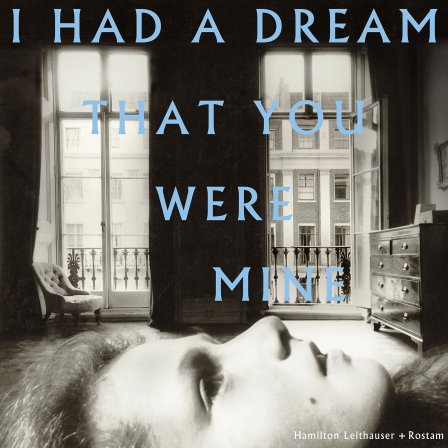The story of The Walkmen and Vampire Weekend is curiously intertwined with the trajectory of American indie rock in the 2000s. Both began as hyped New York groups associated with putative “scenes” before escaping the deathly grip of buzz, honing their sound and producing some of the 21st century’s most well-crafted rock music. Both benefited from indie rock’s increased mainstream exposure in the 2000s and 2010s, appearing on epochal soundtracks, winning Grammys and topping the charts. Indie rock’s success had consequences, however, as its conceptual and aesthetic codes were hollowed out and redeployed by advertisers and shallow imitators alike. In the shadow of this dilution, The Walkmen went on hiatus and Vampire Weekend’s Rostam Batmanglij left the group. What next then, for indie rock musicians in a post-indie world?
For Hamilton Leithauser + Rostam, next is a lateral movement, an airing out of ideas and sounds that didn’t fit their previous bands, and a harking back to classic songwriters and forms: Bob Dylan, The Beatles, Leonard Cohen; blues, rock, doo-wop, folk. In the process, they’ve created a series of wistful, drifting songs; indebted to the past but rooted in the present. It’s a heartfelt collaboration, bringing together one of indie rock’s most distinctive voices and one of its most talented producers. If nothing else, I Had a Dream That You Were Mine confirms how integral Rostam was to Vampire Weekend’s sound, particularly their chart-topping Modern Vampires of the City. He employs the same production style here, placing weighted, clattering drums alongside wispy keys and vocal textures, all the while ensuring ample room for Hamilton’s elastic bray of a voice.
This approach is most ably demonstrated on the fantastic “A 1000 Times,” which kicks off the album. Over light dustings of piano, guitar, and organ, as well as those hard-hitting drums, Hamilton wanders dreamily through New York (“I found your house, I didn’t even try,”) using his voice to paint great swathes of sound across the city. While nothing else on the album sounds quite like it, “A 1000 Times” sets out the stall for this collaboration, sonically and lyrically. It’s an album of fragmentary moments, unmoored from any particular time, one that glides gently across scenes from the rock canon. Songs flicker into view before gradually changing course, as Rostam dots them with new melodies and textures, adjusting their shape and size. “When The Truth Is…” is a case in point, at turns billowing, clattering, and skronking, its lead guitar line ripping the song open before retreating, buffeted along by hushed piano and a spectral, doo-wop backing. The song cooly metamorphoses over its run time, slowly shedding its layers and revealing its silken underbelly as Hamilton croons to some long-lost love.
Hamilton’s lyrics complement Rostam’s itinerant production, dwelling on half-exhaled scenes, fleeting vignettes, and unmoored feelings that float just beyond the penumbra of the present. “In A Black Out” sees people falling asleep in the back of cabs, friends coming and going, all lost in hazy reverie. Hamilton name-checks Joan Didion’s “Goodbye to All That,” an essay concerned with arrivals and departures, and a touchstone for this most peripatetic of albums. Perhaps unsurprisingly, then, many of these songs reference fire, whether in “A 1000 Times’s” “I watched the sparks fly off the fire” or “You Ain’t That Young Kid’s’” “Now there’s ash in my heart/ Where I used to burn.” Like Didion, Hamilton is concerned with time’s queer passage, its dovetailing movements of progression and recursion — from ash to smoke and back again. He floats, through new places and new feelings, noting their deathless similarity to old places and old feelings.
Occasionally these drifting moments coagulate, like a winged insect trapped in amber. On the showstopping “The Bride’s Dad,” Rostam backs Hamilton with languid piano, as Hamilton plays the part of someone giving a speech at a wedding — a friend who’s been too distant and is now fluffing their lines. The song gathers momentum, drums rising suddenly, its kernel revealing itself in the tenderness of a shared moment between narrator and bride, as Hamilton wails “I swear I caught you smile/ From the corner of my eye.” The song reaches its peak, pounding and swaying, and Hamilton outs himself as the bride’s forgotten love, appending one last line so that his cry reads “I swear I caught you smiling/ You’ll always be my darling.” It’s a declaration of doomed love, made all the more poignant by its evanescence. It’s also metonymic for this album as a whole: a finely observed, immaculately produced work, full of diversions, hooks, and charm. Fans of both The Walkmen and Vampire Weekend have much to look forward to as Hamilton and Rostam enter new and uncharted phases of their careers.
More about: Hamilton Leithauser, Rostam, The Walkmen, Vampire Weekend




